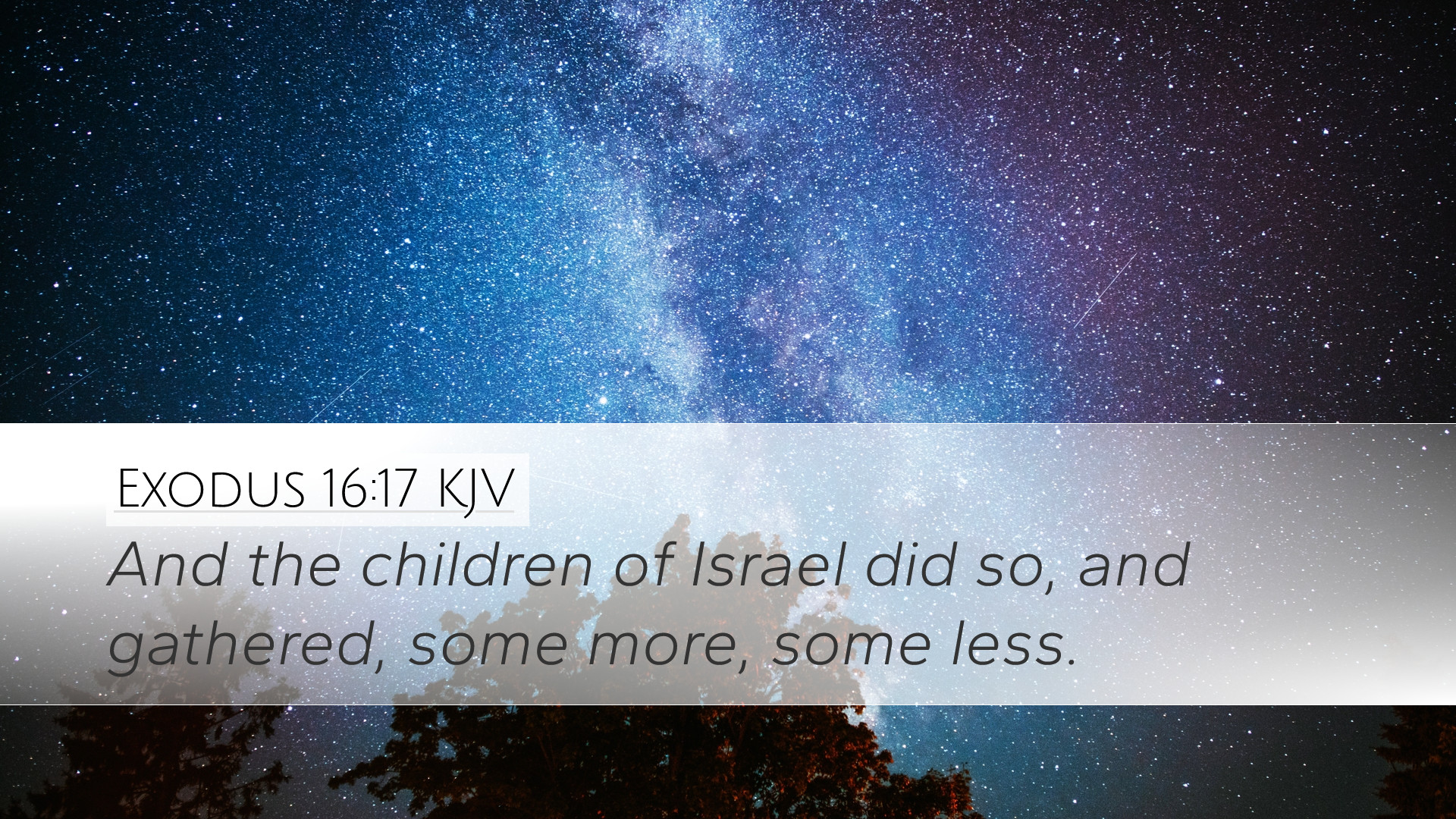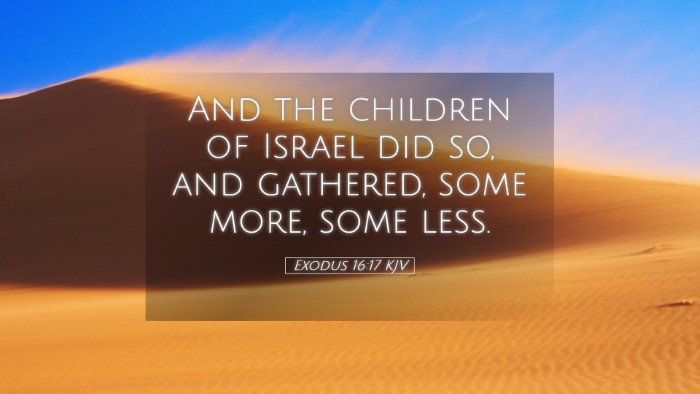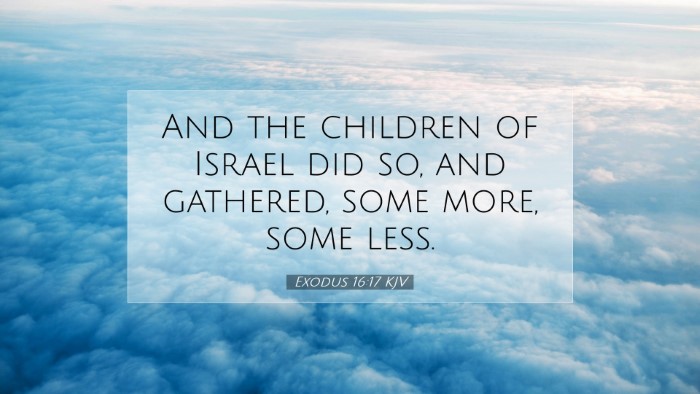Exodus 16:17 Commentary
Exodus 16:17 states:
"And the children of Israel did so, and gathered, some more, some less."
This verse is pivotal in understanding the nature of God's provision for His people during their journey through the wilderness. It reflects both obedience and diversity in how individuals respond to God’s commands.
Context and Background
The book of Exodus details the deliverance of the Israelites from Egyptian bondage and their subsequent journey to the Promised Land. After their miraculous escape and the subsequent crossing of the Red Sea, the people faced considerable challenges, including scarcity of food. Exodus 16 describes God's provision of manna, a miraculous sustenance provided daily to the Israelites.
Divine Provision
Matthew Henry emphasizes that God’s provision in the form of manna was a tangible sign of His care and His ability to meet the needs of His people. When they gathered the manna, some gathered more and some gathered less, which demonstrates varying degrees of faith and obedience among the people.
Albert Barnes adds that this variety in gathering serves as a metaphor for the spiritual provisions available to believers. Each individual’s spiritual walk can differ; some may have a wealth of spiritual insight and experience, while others may gather less. This variance is not indicative of God’s favor but rather the differences in personal experience and faith.
Lessons on Obedience
From this verse, we can draw significant lessons about obedience to God’s commands. Adam Clarke posits that the act of gathering required faith in the divine instructions provided. Each Israelite had the personal responsibility to act on God’s word. Their obedience was crucial to their survival in the wilderness and showcased their trust in God, despite the visible uncertainty of their circumstances.
Moreover, the gathering process mandated personal effort and cooperation within the community. Henry notes that dependence on God does not absolve individuals of their responsibility to act. Faith in God's provision necessitates action; gathering the manna was an active demonstration of trust in God’s instructions.
Diversity in Response
Examining the phrase “some more, some less,” we see that the response to God’s provisions will vary among individuals. Barnes reflects on the implications of this diversity, suggesting that spiritual gifts and resources are distributed according to God's will and purposes. This variance should not discourage believers but rather encourage them to utilize their unique abilities for God’s glory.
Unity in Diversity
The gathering also exemplifies the principle of unity in diversity within the community of faith. Clarke asserts that, despite differing amounts gathered, all Israelites returned to their camp with what was necessary for sustenance, reinforcing the concept that God provides adequately for each individual’s needs within the community. This encourages believers to rejoice in the grace given to others, regardless of the quantity or visibility of that grace.
Theological Reflections
From a theological perspective, the passage serves as a foreshadowing of Christ as the Bread of Life. Henry draws parallels with the New Testament, where Jesus refers to Himself as the true bread from heaven (John 6:35). Just as the Israelites depended on manna for physical sustenance, believers today rely on Christ for spiritual nourishment. This connection not only underscores the continuity of God’s provision throughout scripture but also the sufficiency of Christ to meet all spiritual needs.
Faith and Contentment
Moreover, the act of gathering less or more symbolizes the importance of faith and contentment. Barnes posits that being content with what one receives is a virtue. Discontent can arise from comparing one’s blessings with others', but God’s provision is a reminder that each person is given what they need, tailored to their circumstances and growth. This encourages the faithful to focus on their relationship with God rather than the perceived abundance or scarcity of their blessings.
Practical Applications
- Embrace Diversity: Understand and accept that God works differently in everyone’s life. Encourage community within the church that celebrates each member’s journey with Christ.
- Practice Responsibility: Each individual is responsible for gathering spiritual nourishment. This requires time in prayer, study of the Word, and active participation in the faith community.
- Live in Contentment: Focus on what God has provided and be grateful, rather than comparing blessings with others. Recognize that God's provision is sufficient for your needs.
- Active Reliance on God: Trust in God's daily provisions. While God provides, He expects you to take action in faith, reflecting a true reliance on His goodness.
Conclusion
Exodus 16:17 encapsulates vital lessons about obedience, reliance on divine provision, and the beauty of diversity within the faith community. The insights from commentators like Matthew Henry, Albert Barnes, and Adam Clarke challenge believers to reflect on how they gather God's blessings in their lives and encourages a deepened trust in God’s total provision for both spiritual and physical needs.


